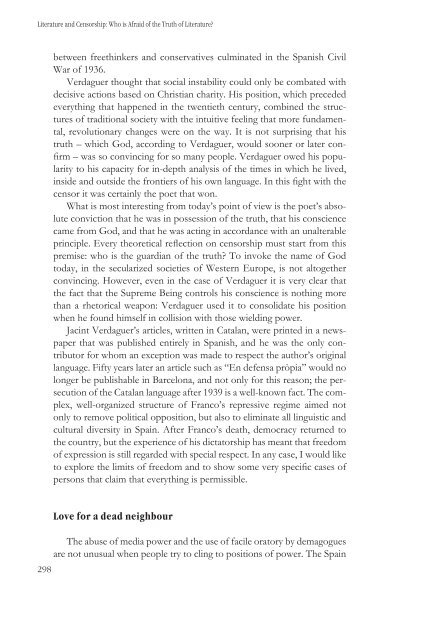Literatura in cenzura - Društvo za primerjalno književnost - ZRC SAZU
Literatura in cenzura - Društvo za primerjalno književnost - ZRC SAZU
Literatura in cenzura - Društvo za primerjalno književnost - ZRC SAZU
- No tags were found...
Create successful ePaper yourself
Turn your PDF publications into a flip-book with our unique Google optimized e-Paper software.
Literature and Censorship: Who is Afraid of the Truth of Literature?between freeth<strong>in</strong>kers and conservatives culm<strong>in</strong>ated <strong>in</strong> the Spanish CivilWar of 1936.Verdaguer thought that social <strong>in</strong>stability could only be combated withdecisive actions based on Christian charity. His position, which precededeveryth<strong>in</strong>g that happened <strong>in</strong> the twentieth century, comb<strong>in</strong>ed the structuresof traditional society with the <strong>in</strong>tuitive feel<strong>in</strong>g that more fundamental,revolutionary changes were on the way. It is not surpris<strong>in</strong>g that histruth – which God, accord<strong>in</strong>g to Verdaguer, would sooner or later confirm– was so conv<strong>in</strong>c<strong>in</strong>g for so many people. Verdaguer owed his popularityto his capacity for <strong>in</strong>-depth analysis of the times <strong>in</strong> which he lived,<strong>in</strong>side and outside the frontiers of his own language. In this fight with thecensor it was certa<strong>in</strong>ly the poet that won.What is most <strong>in</strong>terest<strong>in</strong>g from today’s po<strong>in</strong>t of view is the poet’s absoluteconviction that he was <strong>in</strong> possession of the truth, that his consciencecame from God, and that he was act<strong>in</strong>g <strong>in</strong> accordance with an unalterablepr<strong>in</strong>ciple. Every theoretical reflection on censorship must start from thispremise: who is the guardian of the truth? To <strong>in</strong>voke the name of Godtoday, <strong>in</strong> the secularized societies of Western Europe, is not altogetherconv<strong>in</strong>c<strong>in</strong>g. However, even <strong>in</strong> the case of Verdaguer it is very clear thatthe fact that the Supreme Be<strong>in</strong>g controls his conscience is noth<strong>in</strong>g morethan a rhetorical weapon: Verdaguer used it to consolidate his positionwhen he found himself <strong>in</strong> collision with those wield<strong>in</strong>g power.Jac<strong>in</strong>t Verdaguer’s articles, written <strong>in</strong> Catalan, were pr<strong>in</strong>ted <strong>in</strong> a newspaperthat was published entirely <strong>in</strong> Spanish, and he was the only contributorfor whom an exception was made to respect the author’s orig<strong>in</strong>allanguage. Fifty years later an article such as “En defensa pròpia” would nolonger be publishable <strong>in</strong> Barcelona, and not only for this reason; the persecutionof the Catalan language after 1939 is a well-known fact. The complex,well-organized structure of Franco’s repressive regime aimed notonly to remove political opposition, but also to elim<strong>in</strong>ate all l<strong>in</strong>guistic andcultural diversity <strong>in</strong> Spa<strong>in</strong>. After Franco’s death, democracy returned tothe country, but the experience of his dictatorship has meant that freedomof expression is still regarded with special respect. In any case, I would liketo explore the limits of freedom and to show some very specific cases ofpersons that claim that everyth<strong>in</strong>g is permissible.298Love for a dead neighbourThe abuse of media power and the use of facile oratory by demagoguesare not unusual when people try to cl<strong>in</strong>g to positions of power. The Spa<strong>in</strong>
















